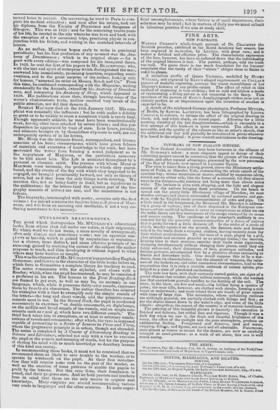ItCUT. LOCH'S READING-BOOKS.
THE point which distinguishes Mr. M'Cutaocn's educational books from others that fall under our notice, is their originality. By which word we do not mean, a mere novelty of arrangement, often only change and sometimes worse ; nor an apparent sim- yl e!ty or brevityi, which is gained by amputations or omissions ; but a clearer, more distinct, and more effective principle of in- structing, gained by studying the nature of the subject the author proposes to teach, and then developing it without regard to what others may have written or taught.
This was the character of Mr. M'Cuttocn's unpretending English Grammar; and this too is the character of the little books before us, which form in themselves a complete library for teaching to read. The series commences with the alphabet, and closes with a Reader; which, when the pupil has mastered, he may be considered a proficient in his art. The lessons in the first Reading-Book are framed to get over, as well as may be, an anomaly in our language, which, while it possesses thirty-nine sounds, expresses them by twenty-six characters. The author therefore has selected his examples with a view to exemplify only the simple sounds of the letters—the long and short vowels, and the primitive conso- sonants most in use. In the Second Book, the pupil is conducted successively to exercises "on double consonants, on diphthongs, on the middle and broad sounds of the vowels, and on single con- sonants such as c and g, which have two different sounds." The third book takes him to exceptions, or at least to arbitrary combi- nations of vowels and consonants; after which, the tyro is supposed capable of proceeding to a Series of Lessons in Prose and Verse, where the progressive principle is in action, though not obtruded. The series is completed by .1 Course of Elementary Reading in Science and Literature, selected not only with a view to exercise the pupil in the sounds and meaning of words, but for the purpose of storing his mind o ith as much knowledge as desultory lessons of this kind can convey. In recommending these books, it must not be conceived that we recommend them as likely to save trouble to the teacher, or to operate by witchcraft on the pupil. At their first introduc- tion they will require some care on the part of the master, as well as the exercise of some patience to enable the pupils to profit by the lessons. But this once done, their foundation is sound, and their progress sure. And let both parents and teachers bear in mind that these are the only means to acquire real knowledge. Many empirics are abroad recommending various easy roads to languages and the other sciences. In mere super-
facial accomplishments, where failure is of small importance, their schemes may be tried ; but in matters of daily use we must submit to laborious practice if we aim at ready skill.


























 Previous page
Previous page